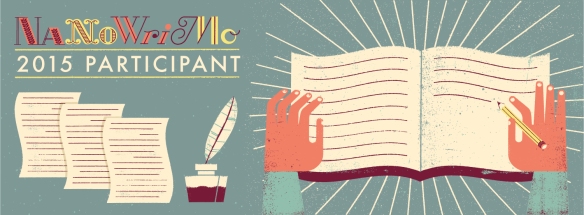
Happy NaNoWriMo everyone!
For anyone who doesn’t know, November is National Novel Writing Month. A month when writers across the world sit down at their computers and challenge themselves to write a novel (minimum 50,000) in 30 days. You are allowed to bring notes and outlines to the table, but all of your actual writing starts on November 1st.
To some people, this might sound like a horrible idea. But to me, it’s one of the best motivational months of the year. As a writer, I am great at editing and rewriting, but first drafts are like pulling teeth. It’s so hard to fill those endless blank pages without fretting and going back to fix all of my (real and imagined) mistakes. NaNoWriMo gives me permission (or rather, it forces me) to ignore my inner critic, get my butt in my chair, fingers on the keyboard and write.
After participating for many years (sometimes officially, sometimes playing along by myself at home), here are four of the things I’ve learned doing NaNo that I use the rest of my writing year as well.
- Make time for your writing. This may seem obvious, but it’s so important. You’re never going to write anything if you keep waiting until all of your other chores are done. Make writing a priority. Set a timer, kick everyone else out of your room, leave the dishes in the sink, turn off the internet (I’m looking at you twitter) and write.
- Set mini goals. 50,000 words in 30 days is daunting. Break it down to achievable chunks. You need to write about 1,667 words a day (or 2334 if you want to take the weekends off). That sounds like a lot, and on the first few days it feels like a lot. But by week 2, 1667 words a day is a breeze. The rest of the year, I do my best to write 500-1000 words a day. It adds up fast and, even if the word are awful, I know I’m making progress. Writing is a muscle, exercise it!
- Disable your delete key. Stop judging yourself. First drafts are awful. Sure there may be moments of brilliance, but for the most part they are like trudging uphill through a stinking bog of clunky dialogue, typos, wrong plot turns and characters who flipflop all over the place. The most important thing about a first draft is getting it out of your head and onto the page, and if you keep hitting delete every time you make a mistake you’ll be stuck in that swamp for years.
- Put it away. Just because you gave yourself permission to write an awful first draft DOES NOT mean you should send it out into the world as soon as you type The End. Take a break, write something else and then come back to edit and rewrite with fresh eyes.
If you are interested in joining NaNoWriMo check out their website! It’s a lot of fun, with a great community of fellow writers to give you support and encouragement. Maybe I’ll see you there!
